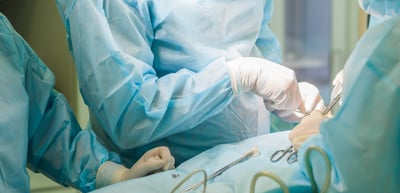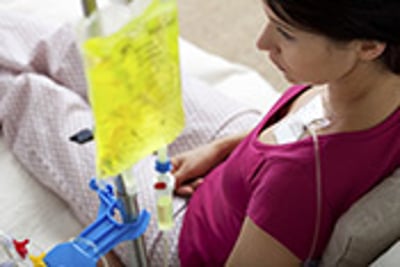FORCE's eXamining the Relevance of Articles for You (XRAY) program looks behind the headlines of cancer news to help you understand what the research means for you.
XRAY is a reliable source of hereditary cancer research-related news and information.
Learn more about the XRAY program
In portal: Breast Cancer, Categories Risk for Recurrence
Relevance: Medium-High


Strength of Science: Medium-High


Research Timeline: Post Approval


Study : What is the risk of breast cancer recurrence after nipple-sparing mastectomy?
Relevance: Medium-High


Strength of Science: Medium-High


Research Timeline: Post Approval


Most relevant for: Breast cancer patients who are considering or have had a nipple sparing mastectomy
Nipple-sparing mastectomy (NSM) offers better cosmetic results for women who have immediate breast reconstruction (at the same time as their mastectomy). Over the past decade, NSM has gained popularity among surgeons and patients. Studies show that women who keep their own nipples have higher rates of satisfaction and psychological well-being after mastectomy and reconstruction compared to women who lose their nipples. However, little data exists on the long-term risk of recurrence following NSM. New research adds to a growing body of evidence suggesting that risk of recurrence is low after NSM in carefully selected patients with breast cancer. (1/25/18)
Read More
Relevance: Medium-High


Strength of Science: Medium-High


Research Timeline: Post Approval


Study : Does extending hormonal therapy impact risk of breast cancer recurrence?
Relevance: Medium-High


Strength of Science: Medium-High


Research Timeline: Post Approval


Most relevant for: Women with early-stage ER-positive breast cancer
Hormonal therapy significantly reduces the risk of recurrence for women with early-stage estrogen receptor-positive breast cancer. Standard hormonal therapy is given for 5 years; extending that therapy for a longer period offers additional protection but has added side effects. This study looked at women who stopped hormonal therapy after 5 years and identified factors that may guide the decision to extend treatment. (12/21/17)
Read More
Guideline : Can MammaPrint guide treatment decisions?
Most relevant for: Women diagnosed with ER-positive, Her2-negative early-stage breast cancer with 0-3 positive nodes
The American Society of Clinical Oncology (ASCO) updated its guidelines for MammaPrint, a genomic tumor test that guides treatment decisions for patients with early-stage invasive breast cancer. The update was based on results from the MINDACT study (11/16/17).
Read More
Relevance: Medium-Low


Strength of Science: Medium


Research Timeline: Animal Studies


Study : Can chemotherapy before surgery fuel breast cancer metastasis?
Relevance: Medium-Low


Strength of Science: Medium


Research Timeline: Animal Studies


Most relevant for: Newly diagnosed breast cancer patients
Some breast cancer patients are given neoadjuvant (before surgery) chemotherapy. However, some recent studies have raised concerns that neoadjuvant treatment might actually trigger cancer spread in certain situations. In the current study, researchers used mouse models and human breast cancers to explore this possibility. (10/10/17)
Read More
Article : Can your breast cancer come back?
Most relevant for:
Elaine Howley’s piece for US News & World Report, “Can My Breast Cancer Come Back?” examines a common misperception that many breast cancer patients have after completing treatment, and explains what can actually occur. (7/25/17)
Read More
Study : Pregnancy around the time of a breast cancer diagnosis does not negatively affect survival
Most relevant for: Young women diagnosed during or right after pregnancy and young survivors considering pregnancy after breast cancer
The number of women who become pregnant around the time of, or after a breast cancer diagnosis is increasing. However, it is unclear whether pregnancy around the time of a breast cancer diagnosis impacts survival. This recently published study demonstrates that the timing of pregnancy does not negatively affect breast cancer survival rates. (5/24/17)
Read More
Relevance: Medium-Low


Strength of Science: Medium-Low


Research Timeline: Animal Studies


Study : Common genetic change found in some tumors of patients who relapse after aromatase inhibitor treatment
Relevance: Medium-Low


Strength of Science: Medium-Low


Research Timeline: Animal Studies


Most relevant for: Patients with ER+ breast cancer
About one in five people diagnosed with estrogen receptor-positive (ER+) breast cancer relapse within 10 years after treatment. Researchers and health care providers do not know why this happens. This early research aims to identify a genetic change in the tumor that may cause relapse, but more studies are needed to understand why patients relapse and who is at risk. (5/3/17)
Read More
Study : Does eating soy affect the risk of death in breast cancer survivors?
Most relevant for:
Is eating soy safe for people who have had breast cancer? This topic has been controversial among health care providers, patients, and survivors for many years because research has yielded mixed results. Some studies suggest people who have been diagnosed with breast cancer should eat more soy products, while other studies recommend they eat less or avoid it altogether. Which should it be? Adding to this research is a new study that asked breast cancer survivors about their soy consumption before and after diagnosis. (4/27/17)
Read More
Study : Friends and family may help breast cancer survival
Most relevant for: People diagnosed with breast cancer
Does having a large social network help breast cancer survivors have better outcomes? Research from the current study found that socially isolated breast cancer survivors had an increased risk of recurrence and breast cancer-specific mortality. (3/16/17)
Read More
Relevance: Medium-High


Strength of Science: Medium


Research Timeline: Human Research


Study : High vitamin D levels at breast cancer diagnosis may be associated with a better prognosis
Relevance: Medium-High


Strength of Science: Medium


Research Timeline: Human Research


Most relevant for: Women at average risk for breast cancer and newly diagnosed women
Vitamin D is most known for its role in maintaining bone health but vitamin D has additional roles in keeping us healthy. In this study, researchers found that breast cancer patients who had the highest amounts of vitamin D in their blood (slightly over the recommended levels) had better health outcomes, including overall survival, than women with lower amounts of vitamin D. This finding adds to the growing evidence for the role of vitamin D in cancer, but it does not change how breast cancer is prevented or treated. (1/10/17)
Read More